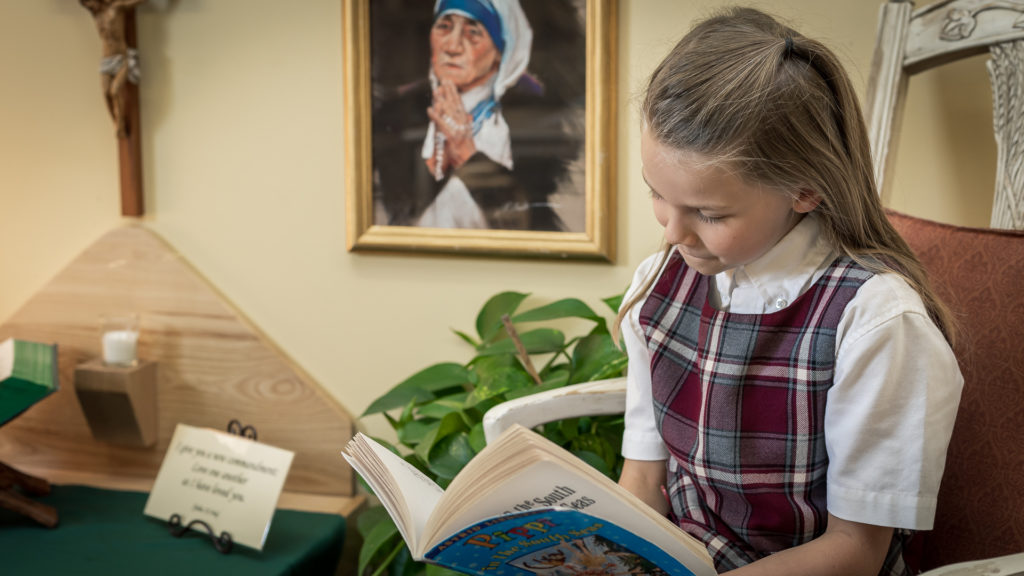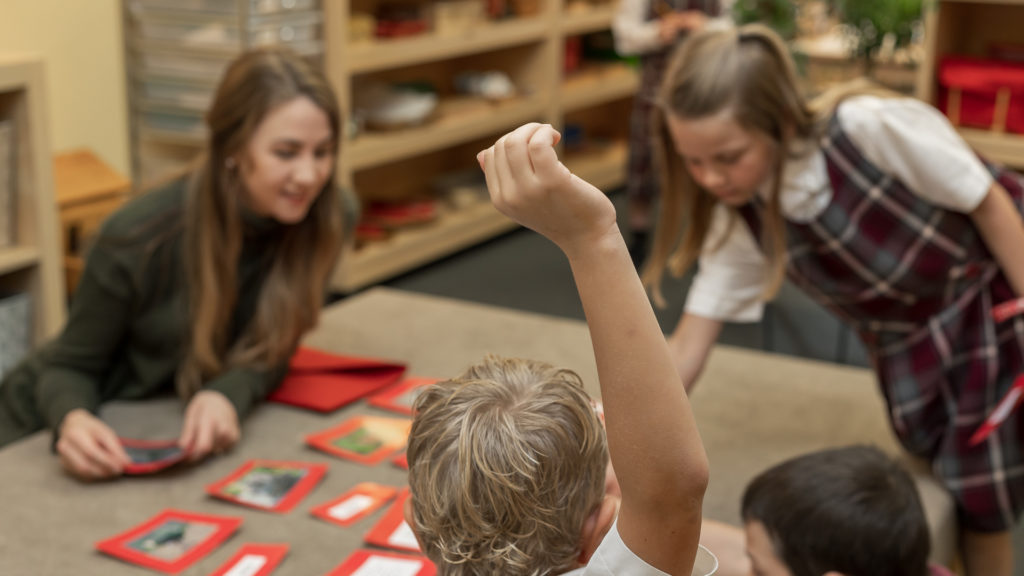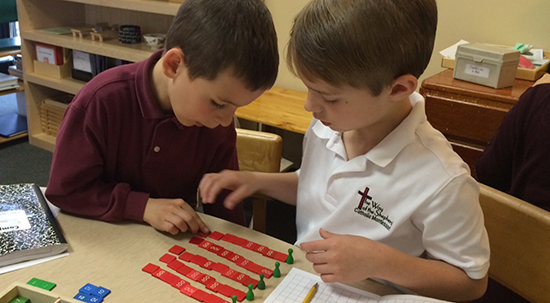Our Montessori lower elementary school drives, encourages and motivates our students as they embark on a new academic journey full of fun and challenges along the way. Here the children transition from the concrete to the abstract, broadening their worldview and emerging as critical thinkers. We aim to follow the child’s lead in their learning and development so that they are consistently engaged and excited by their own educational journey.
“Learning is not the product of teaching. Learning is the product of the activity of learners.“
JOHN HOLT

Spiritual Formation
“From the first moment that a student sets foot in a Catholic school, he or she ought to have the impression of entering a new environment, one illumined by the light of faith” With the advancement in academics the child also advances spiritually.
Our Catholic identity is inseparable from our mission to “enable each child to develop as a well‐integrated human being: spiritually, intellectually, socially, physically, and emotionally.” This is because the full development of the child demands spiritual development. It is a need that is innate to the human person. Our model is Christ Himself, who as a child under His parents’ care and guidance “grew in wisdom and stature before God and men.” (Lk 2:52).
We, at The Way Of The Shepherd Catholic Montessori school make sure that the spiritual well-being of a child is valued and his personality is developed in such a way that he becomes a person of principles and impeccable qualities.

Academic Excellence
One of our fundamental values has always been the academic development of a child where they can uncover and discover new ideas and concepts. Our elementary classrooms strive to provide students with uninterrupted, independently-guided work cycles, the focus of the curriculum takes an exciting new step into the abstract.
Our teaching techniques are such that play with the children’s fully-active imaginations to excite them about the rest of the curriculum. While elementary students are certainly more focused on traditional academic areas, such as language, mathematics, and the sciences, we recognize that they need to continue to develop and hone their fine and gross motor skills which is very critical for their physical development. Often, fine motor skills are perfected through art materials, such as painting, coloring, the usage of tiny parts in our materials, through the practice of handwriting and other physical tasks. Our curriculum focuses on the development of a child from every aspect.

Social Responsibility
With the advancement in academics the social responsibility on the child also increases. At this age, children take another step in their social and moral journey and develop their value system where they can grow as social beings. Keeping this in mind, our Lower Elementary classroom puts an emphasis on collaborative work and whole group lessons, while still guiding each individual student on their own educational path.
Students are again given opportunities to teach younger students as well as other leadership opportunities to sharpen their leadership skills.
Indeed, with increased social interaction comes the possibility of conflict at every level, and to tackle these situations our highly trained, well educated Montessori lead and assistant teachers are always available to guide and support students as they learn to negotiate peacefully with others, to formulate effective problem solving strategies, and to come to a peaceful conclusion.
We understand that nurturing our students’ abilities to create and sustain positive relationships with their peers is very critical, because conflict without resolution can erode a child’s interest and ability to learn and advance. That can ultimately put a halt on the child’s learning interests.
The following subjects are taught in Elementary 1
Language
The Montessori approach to language begins by understanding that language is a major achievement of the human being. As language helped humans build early cultures and civilizations, it also aids children in the work that they must do in the environment. Language can be viewed as a tool or a system that is used to communicate.
Not only do children learn the grammatical rules of language, but they explore the reasons that words exist in the first place. They explore why words are placed in a certain order and why punctuation marks are used.
Children are given opportunities to explore and discover language in a way that inspires wonder and joy. One of the greatest discoveries of the elementary child is that language has power. Through the exploration of reading, researching, and the creative process of writing, children develop and polish their writing skills and command of the English language.
Mathematics & Geometry
In the Elementary classroom, the Montessori method approaches math and geometry as two separate subjects, but still integrated with each other and with the entire elementary curriculum as a whole. Children discover that mathematics has been connected with the lives of human beings from the very beginning of time on earth, and that the mathematical mind is universal and inherent in every human. Because of this trait, mathematics also belongs to the child. In Montessori Elementary, children approach mathematics as another exciting adventure. As guides, classroom teachers give much variety in all areas of mathematics and lead the children to make discoveries. If the children cannot learn a concept one way, a different piece of material may be offered. Guides encourage children to discover the largest and the smallest problems and guide them to also make up their own problems. Children use concrete materials to help them understand abstract concepts. Children learn at their own pace. By the end of elementary, they understand the how and the why of each math concept and how to do it without help of materials.
Social Studies
The Montessori approach to Social Studies begins with the Great Lessons in Geography and History. Through the presentation of the Great Lessons, Guides appeal to the imagination and reasoning mind of the elementary child. A foundation is laid for the child to explore the earth and human history from the beginning of creation through the present day and even looking toward the future impact they will have on this world. They work extensively with timelines and charts that depict creation, the beginning of life, the beginning of human life, and early developments in civilization including math and language. History is taught in a very integrated way, expressing an understanding that humans are creators who use their intellect, and what they find in their environment to meet their needs. With an understanding of basic human needs, they explore the rise and fall of many civilizations throughout history. With this deep understanding of history, they are able to explore current events and their role in the world.
Science
Science is an integrated approach in the Montessori curriculum, loosely broken up into two areas: Geography and Biology. The introduction to science comes on the first few days of the year for the elementary child when children are introduced to the history of the universe, life, and how humans are all created to interact in order and peace. These great lessons are threaded with many experiments, all of which are built on throughout the years in the elementary classroom. In biology children are shown the how and the why of the four main parts of a plant: root, stem, leaf, and flower, and their uses. They work on classification of both plants and animals and study the web of life throughout their time in the classroom. And, they apply their knowledge beyond the classroom in beautiful outdoor learning environments.
Music
Music includes singing, music theory, ear training, eurhythmics, composition, the production of music, history, and literature. The student may work with music, and it could also be in either small or large group work. All aspects of music come together as a whole though singing, history, movement, and composition. Music can inspire interest in math and language. Music notation is really another code, and elementary children love codes. That code can be another form of communication. Music builds community in the elementary classroom and throughout the school. During singing times, some subjects taught are pitch, volume, tone, listening exercises, music appreciation, solfege, rhythm and beat, major and minor scales, harmony, and rounds, among many other concepts. Musical notation is expanded in the Upper Elementary classroom with the addition of instrumental music lessons and ensembles.
Technology
Technology in the Lower Elementary environment consists of materials which children manipulate in order to understand abstract concepts in concrete ways. Children use and create maps and learn mapping skills using concrete materials, and they learn to find directions online using Google maps or another online mapping resources. Children use scientific equipment in everyday work such as magnifying glasses, timers, magnets, scales and weights, rulers, and clocks. They have access to scientific definitions, called nomenclature, and they learn the history of science, inventions, and scientific tools. Children have access to cooking materials and learn how to cook basic food and drinks. They learn real world skills as well, such as event planning, money management, printing and copying, and more when going out into the community to find out more about a particular subject.
Specialists
In addition to the main curricular areas, the Elementary Program also welcomes specialist teachers into its environments for Spanish. Outside the classroom, elementary children participate in physical education.
